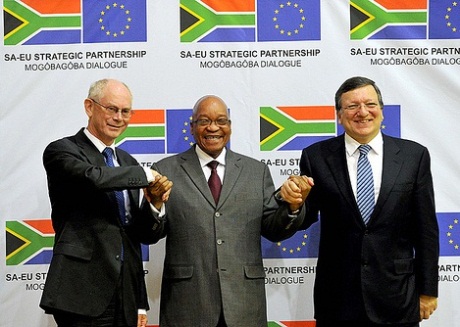A new nuclear cooperation agreement struck between South Africa and the European Union (EU) will support joint nuclear research and could help open access to South Africa's uranium resources.
Signed at the Sixth South Africa-European Union Summit staged in Pretoria on 18 July, the agreement aims to promote "cooperation in the peaceful use of nuclear energy."
 |
| South African president Jacob Zuma (centre) with president of the European Council Herman Achille Van Rompuy (left) and president of the European Commission José Manuel Durão Barroso (right) at the South Africa-European Union Summit in Pretoria (Image: Government of South Africa) |
The European Commission noted that the agreement "results from the mutual interest to establish a stable legal framework for cooperation in the nuclear field and will help in fostering the scientific cooperation between the EU and South Africa."
The agreement's text notes that the two parties will cooperate in "the supply of nuclear and non-nuclear materials, equipment and related technologies associated with civil nuclear power." They will also promote the "peaceful uses of nuclear energy, including commercial exchanges, taking into account that South Africa has large uranium reserves."
While South Africa has significant uranium resources, production has generally been a by-product of gold or copper mining. In 2012, the country produced just 465 tonnes of uranium.
R&D activities
The accord calls for the EU and South Africa to cooperate in researching and developing nuclear energy, including fusion technologies; the use of nuclear materials and technologies, notably in health and agriculture; nuclear safety, radioactive waste and used fuel management, decommissioning, radiation protection including emergency preparedness and response; and developing nuclear safeguards. This will include the exchange of experts, scientific and technological information, as well as establishing joint scientific working groups.
EU and South African research groups will work together on nuclear research projects, drawing on EU funds from programs such as the European Union's Horizon 2020 program that is now being agreed by EU ministers and the European Parliament.
A Commission memorandum said: "As a concrete example, South Africa has developed the Pebble Bed Modular Reactor (PBMR), which could become a viable alternative to other reactor types. European R&D organizations are already involved in this program. South Africa is also active in medical applications of nuclear energy and is a major producer of medical radioisotopes."
A joint statement said that the EU and South Africa would also work together in implementing the African Nuclear Weapon Free Zone Treaty, also known as the Treaty of Pelindaba.
The EU commitments are being routed through its Euratom (European Atomic Energy Community).
By Keith Nuthall
for World Nuclear News






_15863.jpg)







